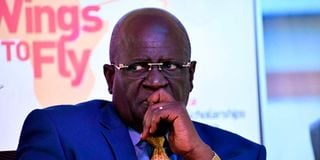Bail us out, Magoha tells private schools over junior high

Education Cabinet Secretary Prof George Magoha.
Education Cabinet Secretary George Magoha has asked parents with children in private primary schools that have junior secondary school sections to keep them there to reduce competition for public secondary schools when Grade Seven rolls out in January.
The government has turned to the private sector to avert a crisis in the already over-enrolled public secondary schools when there will be a double intake next year.
Additionally, the government plans to place Grade 7 learners in private schools during the selection of secondary schools, as opposed to the current practice where learners are only placed in public schools.
According to Prof Magoha, learners remaining in private schools will reduce the stiff competition that is witnessed when the transition to secondary school happens, amid concerns over preparedness.
Under the competency-based curriculum (CBC) framework, the pioneer learners will transition to junior secondary school (JSS) at the end of the primary cycle (Grade 6) in November.
“I’d like to encourage private schools and for the purposes of junior secondary school, it would be very important for the parents who already have children in private schools to retain them in JSS that have been established within those schools so that the cut-throat competition that comes after Standard Eight can be postponed to Year Nine,” Prof Magoha said yesterday. He was speaking at Moi Educational Centre in Nairobi when he inspected the preparation of private schools for junior secondary.
Usually, parents shun public primary schools because of the low quality of education and take their children to private schools to give them a better chance of securing places in well performing public secondary schools.
The January double intake of 8-4-4 Form 1 and CBC Grade 7 learners is likely to create a shortfall of 1,489,144 places in secondary schools. This will put a strain on infrastructure and other resources in secondary schools, including teachers.
With the recommended class size of between 45 and 50 students, these would require 29,783 more classrooms.
According to the Kenya Private Schools Association chair Charles Ochome, the sector targets to put up 5,000 new classrooms for junior secondary, but so far, only 1,290 are complete.
The Jubilee government has a target of building 10,000 classrooms by the time it leaves office in two months, but has struggled to complete the first phase of 6,497, which began late last year and had a completion deadline of March 7.
With only six months left before the transition, parents and teachers are still in the dark over the criteria of placing students in junior secondary.
“We are almost completing that (process). The children are going to apply and we’ll tell them the number of schools that are available. We encourage the private schools which we’ll say are ready for JSS to allow the children apply on the public platform so that they are placed,” the CS said.
The implementation of the CBC has attracted the attention of politicians, with some in the Kenya Kwanza Alliance saying they will abolish it if they win. However, Prof Magoha told off the politicians.
“Just like we have allowed politicians to play their game up there, they should also allow us who are academics and teachers to play ours down here. We’ve no intention of going up there. Once we’re given the policy, we drive it,” he said.





